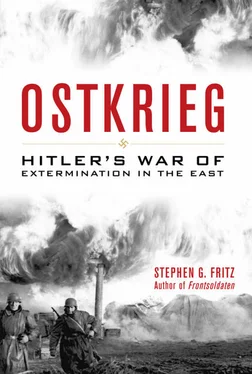Kristallnacht, and the conclusions Hitler drew from it, marked a significant turning point in Nazi policy and thinking. Although emotionally satisfying for Goebbels and other party radicals, the pogrom was a political disaster both domestically and abroad. Harsh international condemnation of Nazi actions might have been expected, but the clear lack of domestic approval for this outburst of public violence raised new obstacles to solving the Jewish question. The reaction to Kristallnacht, and its meaning, clearly troubled Hitler. Not only did he see the international response, especially that of the United States, as yet more evidence of the hostility of world Jewry toward Germany, but the disappointing reaction of the German public also seemed to reinforce once again his fear of the power of the Jews to subvert even popular governments. In Mein Kampf , Hitler had explicitly linked German defeat in war with the destructive influence of the Jews; with the prospect of a new war ever present, the threat of the Jews took center stage in his thoughts. A remark made on 12 November, at the conclusion of a high-level conference to deal with the fallout from Kristallnacht, perhaps provided an indication of Hitler’s thinking as well. “If the German Reich comes into foreign-political conflict in the foreseeable future,” Goering threatened, “it can be taken for granted that we in Germany will think… of bringing about a great showdown with the Jews.” 24
Over the next two months, in a variety of forums, Hitler and other top Nazis expressed more or less the same sentiment. The use of German Jews as hostages in the event of a conflict was openly discussed in the German press, while Goebbels unleashed a blistering anti-Jewish and anti-American propaganda campaign that depicted New York as the center of world Jewry and President Roosevelt as the stooge of the Jewish conspiracy. The threat was clear: if a new conflict erupted in Europe, one that could only result as a consequence of Jewish manipulation, German Jews would be held responsible for the harm that world Jewry inflicted on Germany. The SS organ, Das schwarze Korps , thundered in late November 1938: “We would therefore [in the event of war] be faced with the hard necessity of eradicating the Jewish underworld…. The result would be the actual and final end of Jewry in Germany, its complete annihilation.” Certainly, this should not be construed as evidence for an already existing plan for the Holocaust, but it does indicate the clear emergence of a murderous mentality. Hitler himself revealed such an attitude in a remarkably menacing comment to the Czech foreign minister in late January 1939: “The Jews here [in Germany] will be annihilated. The Jews had not brought about the 9 November 1918 for nothing. This day will be avenged.” 25Not for the first nor for the last time, Hitler vowed to gain retribution for the German defeat in World War I; indeed, the theme “never again another November 1918” ran as a leitmotif through his actions until the end of his life.
Anger, frustration, resentment, willingness to lash out violently at those perceived to be threatening Germany with destruction—these emotions formed the backdrop to Hitler’s speech of 30 January 1939. Ostensibly given to mark the sixth anniversary of the Nazi ascension to power, it served primarily as a recitation of the alleged evils done to Germany by the Jewish conspiracy and a reply to the overt economic and military challenges that Hitler saw emanating from Britain and America. Denied access to vital economic resources, at a disadvantage in the global trading system, and held in debt bondage by the Jewish plutocrats, Hitler raised once again the familiar theme of Lebensraum as the only solution to Germany’s existential dilemma. The Western democracies, however, blocked Germany’s expansion to the east, meddling in an area “in which the English, or any other Western nation have no business at all.” The Germans, Hitler asserted, “in the future will not accept the attempt of Western states to meddle at will in certain issues which are solely our business in order to prevent through their interference natural and rational solutions.” He explicitly linked this obstructionism with the Jewish question, mocking ostensible Western concern but refusal to accept Jewish refugees, and then outlined a possible territorial solution: “I think that the sooner this problem is solved the better. For Europe cannot find rest until the Jewish Question is cleared up. It may well be possible that… an agreement on this problem may be reached in Europe…. The world has sufficient space for settlements.” 26
Hitler then turned to his obsession with Lebensraum. Significantly, he linked Western obstruction in solving this issue, the Jewish conspiracy, and his new fixation on Jews as hostages. If he were to be thwarted in achieving Lebensraum, he now outlined a radical alternative, one that eventually became a self-fulfilling prophecy:
And one more thing I would like to state on this day memorable perhaps not only for us Germans. I have often been a prophet in my life and was generally laughed at. During my struggle for power, the Jews primarily received with laughter my prophecies that I would someday assume the leadership of the state… and then, among other things, achieve a solution of the Jewish problem. I suppose that the laughter of Jewry in Germany is now choking in their throats.
Today I will be a prophet again: if the international finance Jewry within Europe and abroad should succeed once more in plunging the peoples into a world war, then the consequence will not be the Bolshevization of the world and a victory of Jewry, but on the contrary, the annihilation of the Jewish race in Europe. 27
Again, this statement should be seen not as a blueprint for the Holocaust but as a warning, especially to America: stay out of European affairs, and refrain from interfering in matters important to German existence. To reinforce his threat, Hitler demonstrated his awareness of his options and his willingness to use them: the Jews under German control should be regarded as hostages. If the Jewish conspiracy plunged the world into another global war, he warned, he would not hesitate to deal harshly with the Jews under his control. The time for decisions was approaching. Hitler was going to gain living space for the German people; the choice for the Western powers was acceptance or opposition.
Nazism and war were inseparable. Born of a lost war, energized by the desire to gain redemption for the stain of defeat, determined to achieve Lebensraum in Europe as the key to survival in a world of enemies, preoccupied with solving a self-imposed Jewish problem, the National Socialist regime had, from the time it assumed power, set in motion a process of building a “new man and new society” in order to prepare for war. The key to this much-vaunted Volksgemeinschaft was, as Ian Kershaw has stressed, “an attempt at a perpetual re-creation of the ‘spirit of 1914,’” a “true socialism” that would unite all racially valuable Germans and prepare them for the struggle ahead. Nor had Hitler left any doubt about the inevitability of conflict: the German future could be assured only by gaining living space, and it could be won only through force. 28
Hitler’s conception of Lebensraum had been informed and influenced not only by notions of social Darwinism but also by nineteenth-century European colonial and imperialistic practices. The European scramble for colonies in Africa and Asia had been justified not only by economic necessity but also by reference to the alleged racial inferiority of the “backward” and “uncivilized” peoples of those continents. European domination thus seemed a natural and logical consequence, as did the brutalities inflicted on the native peoples. Since Hitler looked to Eastern Europe as the natural sphere of German expansion, and since he viewed the Slavic and Jewish inhabitants of the region as either inferior or threatening, his notion of Lebensraum harbored from the beginning murderous impulses. What had hitherto been done only to conquered populations overseas Hitler now stood ready to inflict on a European population. 29In some respects, then, Lebensraum could be seen as merely a belated continuation of the nineteenth-century Western policy of imperialism, with Eastern Europeans substituting for Africans or Native Americans. At its heart, however, Hitler’s program would prove far more radical and far-reaching, a racialist and exterminationist scheme of limitless aims and brutality.
Читать дальше












